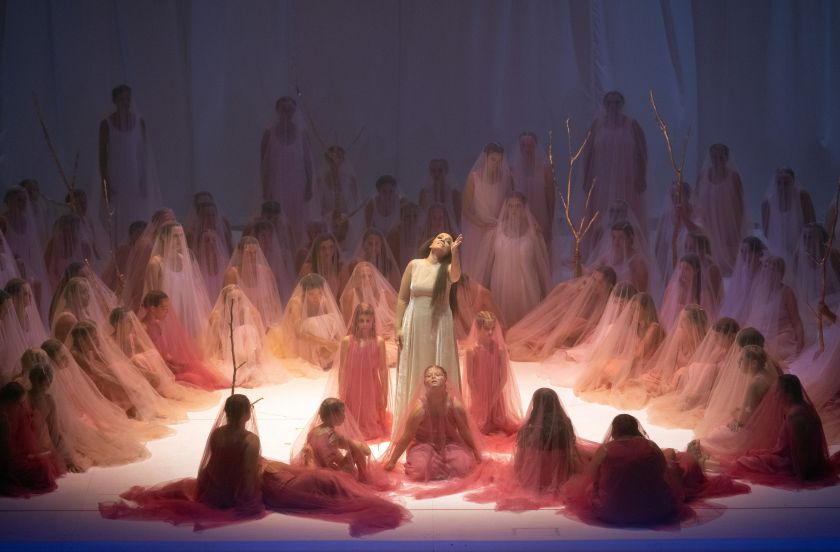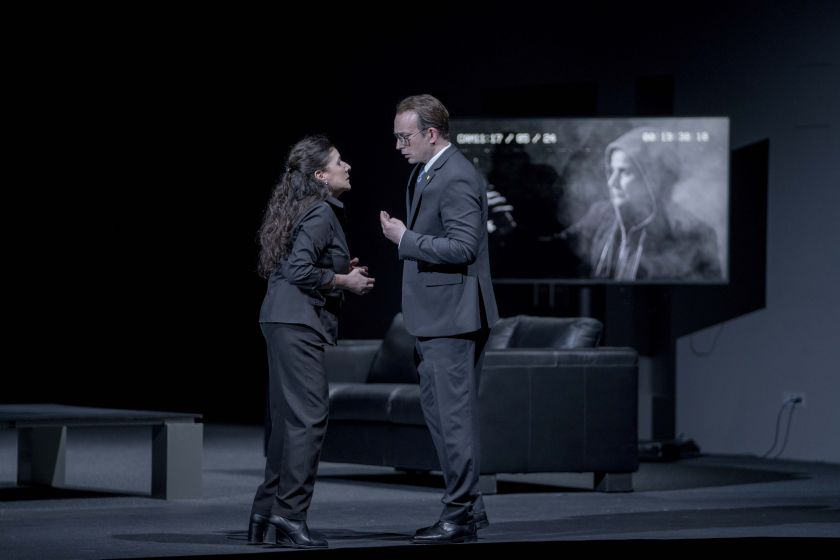Mozart Twice, Restaged
Major themes: Desire, perdition and downfall meet rebellion, betrayal and revenge.

Two Mozart productions to revisit: „Don Giovanni“ in Romeo Castellucci’s acclaimed 2021 version as well as „La clemenza di Tito“, first seen at Whitsun 2024.
“His desire is on fire. What burns there is life”, says Romeo Castellucci about Don Giovanni. He revives his 2021 staging of Wolfgang Amadeus Mozart’s opera at the Salzburg Festival – and his main focus is how to take a fresh look at the protagonist. Three years ago, his version, which interprets the opera in mighty visual images as a kind of counter-Jedermann, was highly acclaimed. As then, Teodor Currentzis will be responsible for interpreting the music, conducting the Utopia Orchestra.
In revisiting his production, the director says that the challenge lies in the fact “that Don Giovanni’s nature is flight – and therefore, he is hard to grasp.” While Don Giovanni flees, “he drags everyone with him towards perdition”. Mozart’s and Da Ponte’s character, who is based on the myth of Don Juan and extends it, is “not only running away from the world and from society. Rather, his true nature is flight. That is why you cannot peg him to one thought,” says the director. He admits to feeling a certain “frustration, which we all feel vis-à-vis this character”. On the other hand, he also considers this challenge the true core of the opera: “The fact that he cannot be grasped defines his greatness.” Even though Don Giovanni is doomed and the opera recounts his death drive just as much as his vitality and desires, Castellucci considers him “the only person who is alive here. For the very reason that he burns, and thereby produces life. Because he opens the field of desires for us.”
To illustrate how many women Don Giovanni has really seduced and also abandoned over the course of the years, Castellucci has come up with an impressive image: he has invited a large number of women from Salzburg to “occupy” the stage at the Großes Festspielhaus. “The horrifying list of Leporello’s register is transformed into an element of flesh and blood, which moves and touches us,” the director comments. “The presence of the women makes visible how the field of desires gradually develops an absorbing, all-encompassing power. The polar schematic of Don Giovanni as the hunter and the women as the prey is reversed.”
Castellucci, who also designed the sets, presents all this within the desecrated, dismantled space of a church, which he has declared Don Giovanni’s headquarters. Here, he stages a game which resembles that of a child playing with building blocks, but also destroying some of them. The child exhibits frustration at the fact that it cannot have everything it wants. Castellucci explains that the ambiguity and complexity as well as the inner imbalance of the protagonist become obvious here.
Castellucci, whom the journal Opernwelt named Director of the Year several times, and who is also responsible here for sets, costumes and lighting, thus casts his own glance on the great seducer of the literary and operatic world. Don Giovanni will once again be played and sung by Davide Luciano. Kyle Ketelsen joins him as Leporello. Dmitry Ulyanov embodies the Commendatore, Federica Lombardi sings Donna Elvira, Nadezhda Pavlova takes on the role of Donna Anna and Julian Prégardien that of Don Ottavio.

A Benevolent Tito for Our Times. The second work by Wolfgang Amadeus Mozart performed this year at the Salzburg Festival is quite different in character. La clemenza di Tito will be part of the Whitsun Festival; the production then sees further performances during the summer. Cecilia Bartoli, the artistic director of the Whitsun Festival, made the city’s greatest son one of the focal points of this year’s festival edition: her stated goal was to convey the joy to be had from singing, hearing and playing his music. “To think about the amount of marvellous music Mozart created in an unbelievably short space of time reduces us to awe and humble silence. He created a universe, a world of its own which gives us endless pleasure. It may surprise you that since taking on the position of artistic director at the Salzburg Whitsun Festival in 2012, I have never focussed on Mozart here. So I thought ‘wenn schon, denn schon’,” thus Cecilia Bartoli.*
For the first time, she will also appear as Sesto in a staged production of La clemenza di Tito. “Last year, I turned back to La clemenza di Tito and realized that I had forgotten how magnificent this stunningly beautiful and unjustly neglected opera is. My re-discovery got me so excited that I decided to perform it on stage for the first time.” In concert productions, she had sung the role of Sesto several times – with Les Musiciens du Prince – Monaco, the orchestra that also performs this time.
Gianluca Capuano conducts. Daniel Behle sings the role of Tito, Alexandra Marcellier that of Vitellia, Mélissa Petit that of Servilia and Anna Tetruashvili that of Annio. Ildebrando d’Arcangelo appears as Publio. Together, the interpret Mozart’s opera seria in a production by Robert Carsen.
Carsen considers La clemenza di Tito a “counterpart” for Die Zauberflöte, which was written almost at the same time. “In Tito, Mozart was completely focused, with a very, very small number of characters in a hermetically sealed world. A very political world, which makes the work special,” says Carsen. “We see how he deals with the people who have betrayed him, and the clemency and magnanimous character, and how he deals with his own feelings of revenge, but also the feelings of the importance of forgiveness.” Carsen notes that “this political background makes it impossible not to think of recent, extremely unexpected events here: although we are not setting this work in Washington in 2021, I cannot help thinking of the storming of the Capitol.” He considers it his responsibility to bring out the contemporary aspects of the tale. Even if it goes back to 1734, he says, the opera, when performed for an audience today, always has a modern resonance.
Wilhelm Sinkovicz
Translation: Alexa Nieschlag
First published on 11.05.2024 in Die Presse Kultur Spezial: Salzburg Festival
*Translator’s note: „Wenn schon, denn schon“ might be translated as „In for a nickel, in for a dime”.
